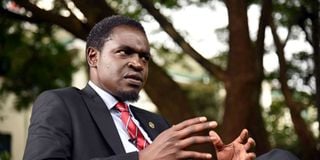Lawyers fight directive barring lucrative government tenders

What you need to know:
- The directive requires State agencies and public institutions to cancel, within 21 days, existing contracts with external advocates that were not approved by the Attorney-General.
- Furthermore, State agencies and public institutions have been directed to withdraw cases they have filed against each other within 14 days, from July 8.
- The current LSK Council has been having strained relations with the executive, especially the Attorney-General’s office, which they have accused of failing to properly advise the government to respect court orders.
A government directive that could see lawyers lose lucrative contracts with State agencies and public institutions has opened a new battlefront with the Law Society of Kenya (LSK), with advocates planning to challenge it in court.
The directive, which is being seen as an escalation of the feud between the executive and the new assertive LSK Council, requires State agencies and public institutions to cancel, within 21 days, existing contracts with external advocates that were not approved by the Attorney-General.
Any future engagement with external lawyers will also have to get approval from the Attorney-General.
Furthermore, State agencies and public institutions have been directed to withdraw cases they have filed against each other within 14 days, from July 8.
The order was signed by Head of Public Service Joseph Kinyua following the July 7 meeting of the National Development Implementation and Communication Cabinet Committee (NDICCC). The commit-tee is chaired by Cabinet Secretary for Interior Dr Fred Matiang’i.
“Ministries, State Departments and State Agencies were directed to withdraw court cases filed against any other State agency in 14 days from the date hereof; not to contract external counsel without the written approval of the Attorney-General; and terminate within 21 days from the date hereof engagements with all external advocates who had been contracted without the express and prior grant of the concurrence of the Attorney-General,” Mr Kinyua said in the communication.
IMPLEMENTATION
Already, ministries and departments have started implementing the directive.
Education Cabinet Secretary George Magoha on July 14 directed all State agencies and public institutions under it to with-draw cases they have filed against each other, not to engage external lawyers without the approval of the Attorney-General and to terminate existing retainers with external advocates.
In a statement, LSK president Nelson Havi said the government directive lacks a legal footing and will collapse.
“It is doubtful whether the Government of the Republic of Kenya has sought and obtained sound legal advice on the action contemplated in the communique by the CS (for Education Prof Magoha). The Attorney-General has no role whatsoever in the procurement of legal services by the State Agencies and Public Institutions. Article 227 of the constitution is emphatic that such services are to be procured through a system that is fair, equitable, transparent, competitive and cost-effective. Existing retainers between State Agencies and Public Institutions on one hand and advocates on the other hand are sustained on this constitutional underpinning as well as the Public Procurement and Assets Disposal Act,” Mr Havi said.
According to the society, the directive by Mr Kinyua seeks to revive a matter that has been dealt with by the courts, in particular the judgment of Justice Pauline Nyamweya made on June 4, 2019, in which she ruled in favour of lawyer Francis Andrew Moriasi.
“The law is settled that the Attorney-General cannot interfere with legal retention by State Agencies and Public institutions,” said Mr Havi.
STRAINED RELATIONS
The current LSK Council has been having strained relations with the executive, especially the Attorney-General’s office, which they have accused of failing to properly advise the government to respect court orders.
The society has also been on the Judiciary’s side in the push-and-pull between the executive and the Judicial Service Commission (JSC) over appointment of 41 judges, which remains pending a year after the commission recommended them to serve as judges.
A number of high-profile lawyers, who have lucrative deals with State agencies and institutions, could be hit hard if the government has its way and the directive is implemented.
But the directive could also expose government institutions and departments to litigation if existing contracts are terminated before the end of the term.
For an institution such as the Independent Electoral and Boundaries Commission (IEBC), they have just completed pre-qualifying 63 law firms that they will use between now through to the 2022 elections.
It is not clear if constitutional commissions and independent offices will be affected by the directive.
INTERESTS
Moreover, there is the question of conflict of interest if in-house lawyers, who by virtue of the Kinyua directive should be the ones to represent their institutions, if the dispute revolves around a decision or an opinion they had given and where they could be called upon as witnesses.
Public sector has been a good place for lawyers who often charge premium rates. For example in 2015, a lawyer who had represented the Central Bank of Kenya (CBK) at a Public Procurement and Administrative Review Board hearing for five days sent a fee note of Sh76 million.
Around the same time, lawyers who had represented the Kenya Airports Authority in the case against businessman Kamlesh Pattni and his company World Duty Free were demanding to be paid Sh290 million. Following the 2013 presidential election petition, lawyers who had represented IEBC in the petition sought Sh360 million from the commission as legal fees.
The directive has emerged just as LSK is preparing for its annual general meeting, which will be held virtually on July 23 owing to the Covid-19 pandemic.
A motion to expel Attorney-General Paul Kariuki and solicitor-general Kennedy Ogeto from the society was to be one of the items on the agenda but the two obtained court order stopping LSK from considering the motion at the AGM. A hearing has been set for July 30, a week after the AGM.





